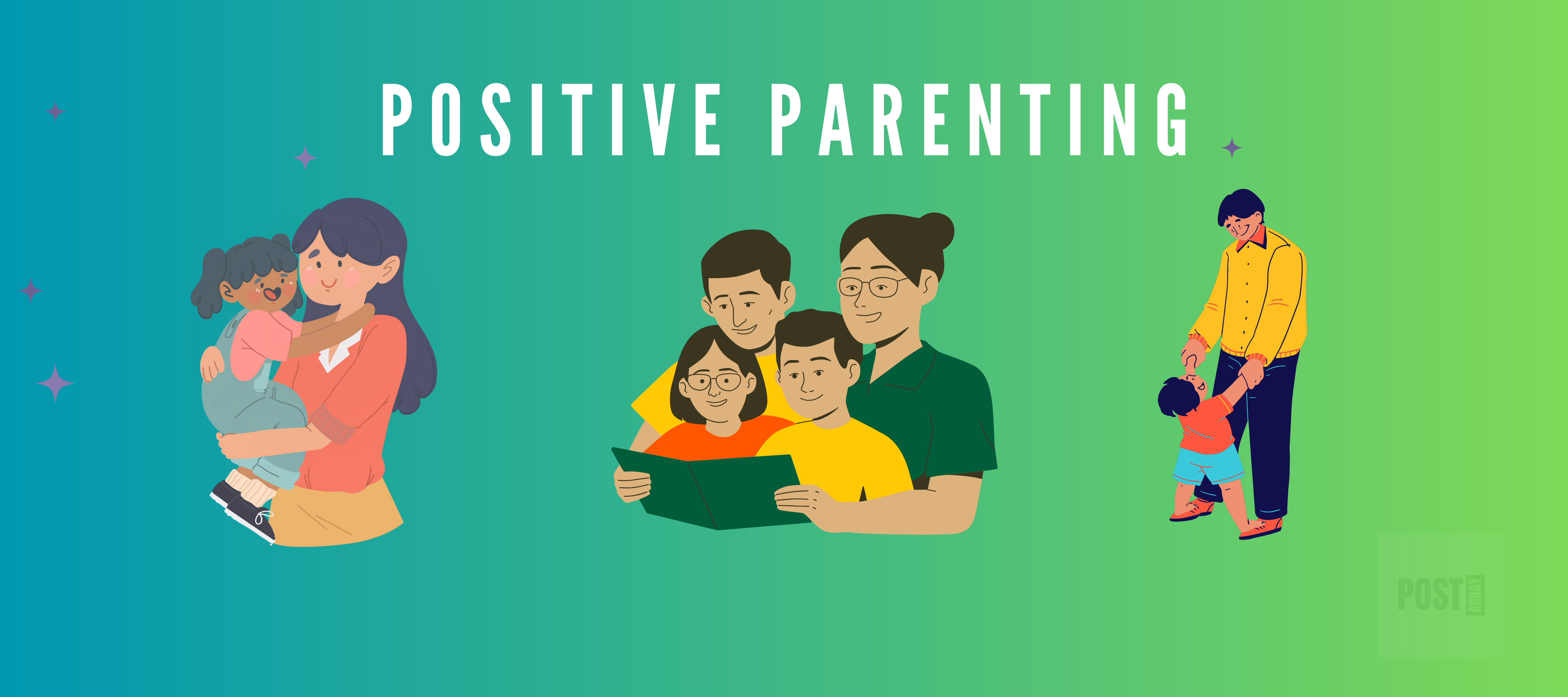Raising happy, well-adjusted children is a goal for every parent. The foundation of this begins with positive parenting—a style that emphasizes love, communication, and guidance rather than punishment or authoritarian rule. Positive parenting techniques not only contribute to a child’s emotional well-being but also help them develop essential life skills like empathy, responsibility, and resilience.
Positive parenting is not about being permissive or allowing children to do whatever they want. Instead, it focuses on guiding children with warmth and structure, helping them understand the consequences of their actions while feeling loved and supported.
1. Understanding Positive Parenting
Positive parenting is based on the principle that children thrive in environments where they feel loved, understood, and respected. This parenting style is grounded in psychological research that shows children are more likely to succeed when raised in a nurturing environment.
Core Principles of Positive Parenting
- Empathy and Understanding: Understanding your child’s feelings and perspective helps build a strong parent-child bond.
- Clear Communication: Setting clear expectations and communicating them effectively ensures that children understand what is expected of them.
- Consistency: Consistent rules and expectations help children feel secure and know what to expect.
- Positive Reinforcement: Encouraging good behavior through praise and rewards reinforces positive actions.
2. Positive Communication Techniques
Effective communication is the cornerstone of positive parenting. It involves listening to your children, validating their feelings, and expressing your own thoughts and expectations clearly.
Active Listening
Active listening is a superpower every parent should embrace. It’s more than just hearing what your child says; it’s about truly understanding their feelings and perspectives. When your little one talks about their day or shares a worry, put down your phone, make eye contact, and show them you’re fully present. Simple cues like nodding, paraphrasing what they said, or asking thoughtful questions can make them feel valued and understood. This not only strengthens your bond but also builds their confidence and emotional intelligence. Active listening teaches kids that their thoughts matter and creates a safe space for open communication—a gift that lasts a lifetime.
Using “I” Statements
Using “I” statements in parenting is a game-changer for handling tough moments without sparking defensiveness. Instead of saying, “You never listen to me!”, try saying, “I feel frustrated when I have to repeat myself.” This shifts the focus to your feelings and avoids making your child feel blamed or attacked. It opens the door for a more constructive conversation, helping them understand how their actions impact you. Plus, it sets a powerful example of how to express emotions calmly and respectfully—an essential life skill. Using “I” statements not only diffuses tension but also strengthens the connection between you and your child.
Encouraging Open Dialogue
Encouraging open dialogue with your child is like building a bridge of trust that lasts a lifetime. It starts with creating a safe space where they feel comfortable sharing their thoughts, feelings, and even mistakes without fear of judgment. Instead of reacting harshly, respond with curiosity and empathy—ask open-ended questions like, “What made you feel that way?” or “How can I help?” Show genuine interest in their world, whether it’s about a school project or a favorite game. When your child knows they can talk to you about anything, you’re not just their parent—you’re their trusted ally, and that’s a relationship worth nurturing.
3. Setting Boundaries with Love
Setting boundaries is essential for teaching children responsibility and self-discipline. Positive parenting techniques emphasize setting these boundaries with love and consistency.
Establish Clear Rules
Establishing clear rules is a fundamental aspect of effective parenting, providing children with a structured framework to navigate their behavior and decisions. Clear rules create consistency, which fosters a sense of security and helps children understand expectations and consequences. It is essential that these rules are age-appropriate, specific, and communicated in a respectful manner to encourage compliance and understanding. For example, instead of a vague directive like “Behave,” a clear rule might state, “Speak kindly to others in the household.” Consistency in enforcing these rules is crucial, as it reinforces their importance and helps children internalize them. Ultimately, clear rules are not about control but about guiding children to develop self-discipline and respect within a supportive environment.
Consistent Consequences
Consistent consequences are a cornerstone of effective parenting, providing children with a clear understanding of the relationship between actions and outcomes. When consequences are predictable and fairly enforced, children are more likely to respect boundaries and internalize values. Consistency ensures that rules are taken seriously and prevents confusion, which can arise from arbitrary or inconsistent responses. For example, if a child knows that failing to complete homework results in reduced screen time, they are more likely to take the rule seriously. Importantly, consequences should be proportional, age-appropriate, and delivered calmly to reinforce the lesson rather than create resentment. By maintaining consistency, parents foster a sense of accountability and fairness, helping children develop self-discipline and a deeper respect for the family structure.
Positive Reinforcement Over Punishment
Positive reinforcement, rather than punishment, is a highly effective approach in parenting that nurtures desirable behaviors while fostering a supportive relationship. By acknowledging and rewarding a child’s positive actions—whether through praise, privileges, or tangible rewards—parents encourage those behaviors to be repeated. For instance, commending a child for completing their homework on time reinforces responsibility and motivation. Unlike punishment, which often focuses on mistakes and can lead to resentment, positive reinforcement emphasizes growth and achievement, boosting self-esteem and emotional well-being. When used consistently and thoughtfully, this approach helps children internalize good habits, making discipline a constructive process that builds character and mutual respect.
4. Building Emotional Resilience
Emotional resilience is the ability to cope with stress and adversity. Teaching your child emotional resilience is one of the most important aspects of positive parenting.
Modeling Resilience
Modeling resilience is a vital aspect of parenting, as children often learn how to navigate challenges by observing their parents’ responses. Demonstrating calmness, adaptability, and a problem-solving mindset in the face of adversity teaches children valuable coping mechanisms. For example, when a parent encounters a setback, openly discussing how they plan to overcome it provides a powerful lesson in perseverance. Equally important is showing emotional regulation, such as managing frustration constructively. By modeling resilience, parents empower children to view obstacles as opportunities for growth, fostering a sense of confidence and emotional strength that will serve them throughout life.
Encouraging Problem-Solving
Encouraging problem-solving in parenting is a critical strategy for fostering independence and critical thinking in children. Rather than providing immediate solutions, parents can guide their children to analyze challenges, consider alternatives, and make informed decisions. For instance, when a child faces a conflict with a peer, asking questions like, “What do you think might help resolve this?” empowers them to develop their own solutions. This approach not only builds confidence but also instills resilience, as children learn to navigate setbacks constructively. By consistently encouraging problem-solving, parents prepare their children to approach life’s complexities with creativity and a sense of accountability, laying the foundation for lifelong self-reliance.
Normalizing Emotions
Normalizing emotions in parenting is essential for fostering emotional intelligence and mental well-being in children. By acknowledging and validating a child’s feelings, parents create an environment where emotions are not only accepted but understood. For instance, instead of dismissing a child’s frustration, parents can say, “It’s okay to feel upset. Everyone gets frustrated sometimes, and it’s important to express it in a healthy way.” This approach helps children recognize that all emotions, whether positive or negative, are natural and manageable. Teaching children to identify and articulate their emotions empowers them to navigate their feelings with confidence and empathy. Normalizing emotions lays the groundwork for children to develop emotional resilience and healthy coping strategies, essential skills for their overall development.
5. Creating a Positive Home Environment
A positive home environment is crucial for the overall well-being of your child. This environment is one where children feel safe, loved, and valued.
Quality Family Time
Quality family time is a fundamental aspect of effective parenting, as it strengthens bonds and fosters a sense of security and belonging in children. Engaging in shared activities, such as family dinners, outdoor outings, or even simple conversations, provides opportunities for connection and meaningful interaction. During these moments, parents can model positive behaviors, reinforce values, and create lasting memories. It is not the quantity of time spent together that matters most, but the intention behind it—being fully present, attentive, and engaged. Quality family time nurtures communication, emotional well-being, and a sense of unity, all of which are essential for a child’s healthy development and a resilient family dynamic.
Establishing Routines
Establishing routines in parenting plays a crucial role in providing children with a sense of stability and security. Consistent daily routines help children understand what to expect, reduce anxiety, and foster good habits. Whether it’s a set bedtime, regular mealtimes, or a structured after-school routine, these predictable patterns allow children to feel more in control of their environment. Routines also create opportunities for parents to model discipline, responsibility, and time management. Moreover, having a structured schedule promotes emotional well-being by allowing children to balance work, play, and rest. By establishing clear and consistent routines, parents lay the foundation for their children to develop self-regulation skills and a strong sense of responsibility.
Positive Role Models
Positive role models are essential in parenting, as children often mirror the behaviors, values, and attitudes of the adults around them. Parents who demonstrate integrity, kindness, resilience, and respect for others serve as powerful examples for their children to follow. By consistently modeling these qualities, parents instill important life skills and ethical standards in their children. For instance, showing patience in difficult situations, treating others with respect, and maintaining a strong work ethic can influence a child’s development and worldview. Positive role models not only guide children through everyday challenges but also empower them to develop their own sense of responsibility and character. In this way, parents play a pivotal role in shaping the future behavior and values of their children.
6. Discipline with Dignity
Discipline is an important part of parenting, but it should be done in a way that maintains the child’s dignity. Positive parenting advocates for discipline that is respectful and supportive.
Time-In Rather Than Time-Out
Time-in, rather than time-out, is an effective parenting strategy that focuses on connection and emotional regulation rather than isolation. When a child exhibits challenging behavior, a time-in encourages parents to engage with the child, offering comfort, understanding, and an opportunity to reflect on their emotions in a supportive environment. This approach helps children process their feelings, learn appropriate coping strategies, and understand the impact of their actions. By staying present and emotionally attuned, parents can model empathy and provide guidance, fostering a stronger parent-child bond. Time-in nurtures a child’s emotional intelligence, teaching them how to manage their emotions constructively, while reinforcing a sense of security and belonging.
Natural Consequences
Natural consequences in parenting refer to the outcomes that naturally occur as a result of a child’s actions, offering valuable learning opportunities without the need for parental intervention. For example, if a child refuses to wear a coat on a cold day, they may become uncomfortable, which teaches them the importance of dressing appropriately. This approach allows children to experience the direct results of their behavior, fostering personal responsibility and decision-making skills. By allowing natural consequences to unfold, parents can encourage critical thinking and problem-solving, while also maintaining a non-punitive approach to discipline. When used thoughtfully, natural consequences empower children to learn from their mistakes and develop greater self-awareness, ultimately guiding them toward more thoughtful and informed choices in the future.
7. Fostering Independence and Responsibility
Teaching children to be independent and responsible is a key goal of positive parenting. It helps them develop confidence and prepares them for adulthood.
Age-Appropriate Responsibilities
Age-appropriate responsibilities in parenting are crucial for fostering a child’s sense of autonomy, competence, and accountability. Assigning tasks that align with a child’s developmental stage helps them build essential life skills while promoting a sense of contribution and self-worth. For younger children, simple chores such as putting away toys or helping set the table provide opportunities to practice responsibility in a manageable way. As children grow, their responsibilities can expand to include tasks like managing homework, doing laundry, or assisting with family meals. By gradually increasing responsibilities in a thoughtful and supportive manner, parents equip their children with the skills necessary for independence, time management, and cooperation. This approach not only prepares children for adulthood but also reinforces the importance of family contribution and personal growth.
Encouraging Decision-Making
Encouraging decision-making in parenting is essential for fostering independence, critical thinking, and a sense of responsibility in children. By allowing children to make choices within appropriate boundaries, parents empower them to take ownership of their actions and understand the consequences of their decisions. For younger children, this may involve selecting their own clothes or choosing a snack, while older children can be encouraged to make decisions regarding their studies or social activities. By discussing potential outcomes and guiding them through the decision-making process, parents help children develop problem-solving skills and confidence in their ability to make informed choices. Encouraging decision-making also promotes self-discipline and accountability, as children learn to navigate the complexities of daily life with thoughtfulness and autonomy.
Conclusion: The Lasting Impact of Positive Parenting
Positive parenting techniques are essential for raising happy, well-adjusted children. By focusing on love, empathy, communication, and consistency, you create a nurturing environment where your child can thrive. The principles of positive parenting not only help children develop essential life skills but also strengthen the parent-child relationship, leading to a happier, more harmonious family life.
Incorporating these techniques into your daily parenting routine will not only benefit your child but will also contribute to a more positive and fulfilling parenting experience.




